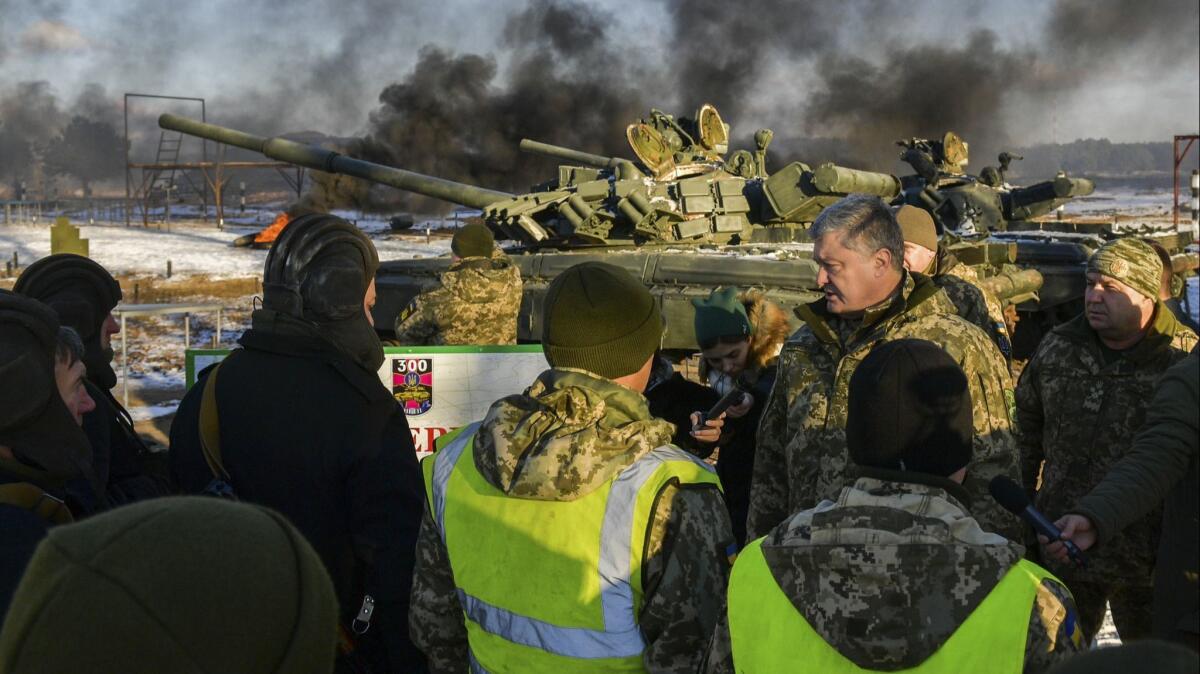Ukrainian president calls for NATO ships to help in dispute with Russia

- Share via
Reporting from Moscow — Ukrainian President Petro Poroshenko on Thursday called for NATO to deploy ships into the Sea of Azov, an inland sea his country shares with Russia, to support Kiev against attempts to take control of those waters after the Russian coast guard fired upon and seized three Ukrainian naval boats attempting to access the sea on Sunday.
“We hope that NATO states are prepared to send naval ships to the Sea of Azov to support Ukraine and provide security,” Poroshenko was quoted as saying in an interview published Thursday by the German newspaper Bild. “The only language [Russian President Vladimir Putin] understands is the solidarity of the Western world.”
No Western leaders have given any indication that they are prepared to send ships through the Kerch Strait and into the Sea of Azov. But the Kremlin reacted quickly to Poroshenko’s calls. Putin’s spokesman, Dmitry Peskov, said the plea for North Atlantic Treaty Organization ships to deploy into the sea was “clearly aimed at provoking further tensions.”
Meanwhile, President Trump abruptly canceled a scheduled meeting with Putin, less than an hour after telling reporters he expected to meet with the Russian leader on Saturday in Argentina. Trump told reporters he would be briefed on Russia’s seizure of the three Ukrainian ships and 24 crewmen last weekend.
“Based on the fact that the ships and sailors have not been returned to Ukraine from Russia, I have decided it would be best for all parties concerned to cancel my previously scheduled meeting,” Trump tweeted from Air Force One while flying to the Group of 20 summit in Buenos Aires, where the meeting was scheduled to take place.
Sunday’s clash in the Black Sea has revived fears that tensions between Ukraine and Russia, which began in 2014 when Moscow annexed the Crimean peninsula, could spiral into an all-out war. Since seizing Crimea, Russia has opted to refrain from direct conflict, instead supporting a breakaway insurgency in the eastern Ukrainian regions of Donetsk and Luhansk.
Responding to the incident Monday, Poroshenko called for martial law to be implemented in 10 regions of Ukraine deemed at risk of Russian aggression. The move, which has dubious military value, has been criticized as a campaign ploy by a wartime president. Poroshenko is up for reelection in March, and recent polling suggests he is deeply vulnerable to political rivals.
The Ukrainian border service said Thursday that during the period of martial law, which the Ukrainian parliament approved for a period of 30 days, access to Crimea via the heavily controlled land border would be restricted to non-Ukrainian citizens. The only other way to reach Crimea is by flights from Russia or a new Moscow-financed bridge across the Kerch Strait.
Using these alternate Russian routes to Crimea is illegal under Ukrainian law, and violators can be banned from the country for three years.
Since the martial law announcement, Poroshenko has been warning of imminent Russian attack and calling on Western supporters to pressure Moscow into returning the three boats and their crewmen — all of whom face Russian charges of violating its borders.
In his Bild interview, Poroshenko accused Putin of trying to rebuild the Russian empire and treating Ukraine as a colony. “We can’t accept Russia’s aggressive policies,” he said. “First it was Crimea, then eastern Ukraine, and now he wants the Sea of Azov.”
Ukraine has accused Russia of closing off the Kerch Strait, the waterway running between Russian-controlled Crimea and the Russian mainland, to vessels travelling to Ukrainian ports on the sea as tensions continue to rise.
“The Ukrainian ports on the Sea of Azov — Berdiansk and Mariupol — are effectively under blockade by the Russian Federation,” Ukrainian Infrastructure Minister Volodymyr Omelyan wrote on Facebook late Wednesday. “Vessels are being barred from leaving and entering. … Only vessels moving toward Russian ports on the Sea of Azov are permitted entry.”
Omelyan said that Russia has essentially blockaded the sea and that 35 vessels were stuck in limbo. The actions of the Russians are intended, he said, to escalate the crisis and ultimately “drive Ukraine out of our own territory — territory that is ours in accordance with all relevant international laws.”
The Kremlin denied this accusation Thursday.
“I don’t know of any current restrictions,” Kremlin spokesman Peskov said. “On the contrary, we know that the Kerch Strait is working normally. You know that sometimes, due to weather conditions, the port of Kerch, which plays the role of administration, can make decisions about regulating navigation.”
Barging into the Sea of Azov, via the Kerch Strait, would be a tricky proposition for NATO, of which Ukraine is not a member. Both bodies of water are considered inland waters of Russia and Ukraine, and are not open for free navigation by third parties.
Ukraine has aspired to NATO membership and NATO does engage regularly with Ukraine via a special commission dedicated to helping with consultation and guidance on Ukrainian military reforms — something that is often a prelude to formal membership bids. Since 2014, the biggest obstacle to Ukrainian NATO membership has been its conflict with Russia, as NATO does not induct nations with standing border disputes.
NATO has not provided any material support for Ukraine, but frequently backs Kiev’s positions vis-a-vis Russia.
NATO spokeswoman Oana Lungescu did not directly address Poroshenko’s call Thursday, but said “there is already a lot of NATO activity in the Black Sea, and we will continue to assess our presence in the region.”
Bodner is a special correspondent. Times staff writer Noah Bierman in Washington contributed to this report.
UPDATES:
3:40 p.m.: This article was updated with additional details.
This article was originally published at 9:20 a.m.
More to Read
Sign up for Essential California
The most important California stories and recommendations in your inbox every morning.
You may occasionally receive promotional content from the Los Angeles Times.













